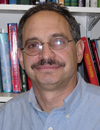David L. Kaplan,
Stern Family Endowed Professor of Engineering, Professor & Chair -- Dept of Biomedical Engineering,
Tufts University
David Kaplan holds an Endowed Chair, the Stern Family Professor of Engineering, at Tufts University. He is Professor & Chair of the Department of Biomedical Engineering and also holds faculty appointments in the School of Medicine, the School of Dental Medicine, Department of Chemistry and the Department of Chemical and Biological Engineering. His research focus is on biopolymer engineering to understand structure-function relationships, with emphasis on studies related to self-assembly, biomaterials engineering and functional tissue engineering/regenerative medicine. He has published over 600 peer reviewed papers and edited eight books. He directs the NIH P41 Tissue Engineering Resource Center (TERC) that involves Tufts University and Columbia University. He serves of the editorial boards of numerous journals and is Associate Editor for the ACS journal Biomacromolecules. He has received a number of awards for teaching, was Elected Fellow American Institute of Medical and Biological Engineering and received the Columbus Discovery Medal and Society for Biomaterials Clemson Award for contributions to the literature.
|

|
|

 Add to Calendar ▼2017-03-16 12:00:002017-03-16 13:00:00Europe/LondonBiomaterial Printing FrontiersSELECTBIOenquiries@selectbiosciences.com
Add to Calendar ▼2017-03-16 12:00:002017-03-16 13:00:00Europe/LondonBiomaterial Printing FrontiersSELECTBIOenquiries@selectbiosciences.com Add to Calendar ▼2017-03-16 00:00:002017-03-17 00:00:00Europe/London3D-Bioprinting, Tissue Engineering and Synthetic BiologySELECTBIOenquiries@selectbiosciences.com
Add to Calendar ▼2017-03-16 00:00:002017-03-17 00:00:00Europe/London3D-Bioprinting, Tissue Engineering and Synthetic BiologySELECTBIOenquiries@selectbiosciences.com